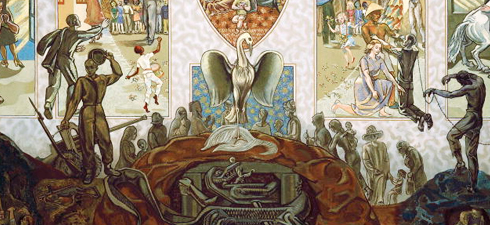Der Spiegel has revealed that Germany's new Christian-democrat and liberal coalition government has decided not to campaign for a permanent German seat on the UN Security Council, but aims to use its influence to obtain one for Europe. Now that the Lisbon Treaty – which will establish a more unified and consistent European foreign policy – is about to be implemented, we should begin to establish procedures that will pave the way for a European seat on the Security Council by moving forward in small steps (just as we have done with the process of European unification).
In fact, at the UN – whether it be in the General Assembly, in the various commissions, or in the Security or Economic and Social Councils etc. – the Union is always (or almost always) represented by the country, which has charge of the rotating EU presidency. However, the EU Presidency is totally absent from the informal meetings of the Security Council, which are held behind closed doors, in a small chamber adjacent to the Council room that is strictly off-limits to non-members: in fact, only the ambassador and two delegates are admitted for each member country. It is here in this tiny chamber – nicknamed the “holy of holies” – that 99% of the important decisions on Security Council projects are decided.
In the short-term, why not ask the EU member that is elected to the Security Council for two years – which at the moment is Austria – to include a senior civil servant from the country that is currently in charge of the EU Presidency — Spain will take over on 1st January— in its delegation? This would enable a Spanish diplomat to be present in the Council's "holy of holies" right behind the Austrian ambassador. The presence of a representative of the EU Presidency would enable Europe to follow developments on issues presented to the council; and if there is a common European position on a particular issue, the Spanish representative – with the consent of the Austrian ambassador – could express the EU point of view, and enable Europe to take the floor when major decisions concerning war and peace in the world are being decided.
Obviously, Austria and Spain would have to agree to this system, which is not without a precedent. Over the last few years, Argentina and Brazil have made use of a similar arrangement in the Latin American regional group. When either of the two countries is elected to the Security Council, a senior diplomat from the non-elected country joins the delegation of the elected country in the Security Council. Perhaps Europe should now attempt to follow this example?
Was this article useful? If so we are delighted!
It is freely available because we believe that the right to free and independent information is essential for democracy. But this right is not guaranteed forever, and independence comes at a cost. We need your support in order to continue publishing independent, multilingual news for all Europeans.
Discover our subscription offers and their exclusive benefits and become a member of our community now!












